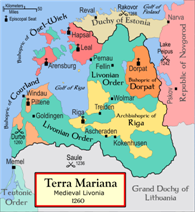
THE VOICE OF INTERNATIONAL LITHUANIA
|
VilNews has its own Google archive! Type a word in the above search box to find any article.
You can also follow us on Facebook. We have two different pages. Click to open and join.
|
Archive for October, 2012
- Posted by - (0) Comment

“Put your heart, mind, and soul into even your smallest acts. This is the secret of success.”
Swami Sivananda
Read more…
__________________________
Psychologists who have studied happiness have learned that material gain boosts happiness for only a short time
Mr. Styles,
When I read your article, many thoughts flashed through my mind. Let me just share a few:
My heart skipped a beat when I read what you wrote about success: "I believe that a successful individual is one who does things that bring him or her satisfaction, things that allow a person to put their heart, mind, and soul into even the smallest act..." I recall one of my relatives who regarded herself as a failure, because she believed that cooking and cleaning house were not regarded as meritorious occupations. Yet she was a marvelous housekeeper. I never saw a speck of dust in her apartment. Her cooking was not only delicious, but extremely healthy -- and the results were immediately apparent. All of her friends marveled at how she looked fifteen years younger than her years would suggest. Having cleaned house, cooked my own meals, and cared for my son when he was a toddler and I was unemployed, I know how challenging the chores of daily life can be. But done regularly, chores become effortless habits. In the words of the great philosopher Aristotle, "We are what we repeatedly do. Virtue {excellence in living] is not an act, but a habit"
Psychologists who have studied happiness have learned that material gain boosts happiness for only a short time. Dr. Philip Brickman studies a group of happiness and found that while they experienced a temporary boost in mood, within as short a time as a month, they returned to their former levels of mood. People in many prosperous countries like the United States, reported being no more happy during the economic boom of the nineties than they were decades ago. In fact, the incidence of depression, especially among young people, has skyrocketed.
Like you, I have learned that the happiest moments of my life have not been associated with the achievement of success as defined by the society I live. After passing my oral examination for my doctorate, I was surprised that instead of feeling jubilant, I felt strangely detached, almost empty. When was I happiest? As a child playing with my friends in a poor working-class neighborhood in Chicago, or when I first discovered the joys of learning on my own and spent an entire summer, sneaking into the adult section of our local library. As a teacher when I saw the gleam of sudden understanding flash across a student's face when she or he grasp a difficult concept. As a mountain hiker, beholding the beauties of the verdant valley below. Harvard psychologist Dr. Tal Ben-Shahar has noted his best-selling book "Happier": "Meaningful and pleasurable activities can function like a candle in a dark room... For a single parent, a happiness booster in the form of a meaningful outing with her children over the weekend can change her overall experience of life..."
Although material things are important in so far as they help us obtain the necessities we need to survive, neither they nor fame will bring us success, which to me seems like a very dangerous word due to its ambiguity. As you have observed, if we cannot take joy in the acts we do today, when will we experience the happiness we seek?
Boris Bakunas
- Bookmark :
- Digg
- del.icio.us
- Stumbleupon
- Redit it
- Posted by - (0) Comment

Foreign Minister Azubalis:
Belarus and Russia plan to build unsafe nuclear power plants at Lithuania’s borders
When speaking at the annual conference "Independent Energy – Strong Economy" on 10 October, Lithuanian Minister of Foreign Affairs Audronius Azubalis emphasized that although Lithuania regained its independence more than 22 years ago, it still may not freely choose importers of oil, gas or electricity, reported BC the MFA.
Read more…
- Bookmark :
- Digg
- del.icio.us
- Stumbleupon
- Redit it
- Posted by - (0) Comment

The totalitarian mindset
He writes:
“When the Soviet Union collapsed, a totalitarian regime had crumbled, but the Totalitarian Mindset -- which demands absolute conformity in thought, word, and deed – survived, and in many quarters, continues to thrive. How do we explain this spike in political and religious intolerance, hate-speech, and violence? Why does the Totalitarian Mindset exist even after a century in which mass murderers like Hitler, Stalin, and Mao Zedong turned much of the globe into a mass grave?”
Read more…
__________________________
Great article!
Hope everyone reads it.
Kestutis Eidukonis
__________________________
My hope was that its message would find the perfect home in VilNews
Thank you for your gracious words, Kestutis. I am very glad that you liked the article "The Totalitarian Mindset." My hope was that its message would find the perfect home in VilNews, an e-publication with a worldwide readership and a policy of continuing to act as an outspoken voice for democracy, freedom of expression, and a renewed Lithuania that faces the future with courage and determination. I look forward to an opportunity to speak to you by phone, or perhaps in person if we are ever in Lithuania at the same time.
Boris Bakunas
__________________________
I found this article very true to how I try to practice living in general
As someone who has a fascination with psychology and other social sciences I found this article very true to how I try to practice living in general.
For many years I was a frequent blogger and forum poster on Myspace and was frequently posting in anger and other combative type emotions. I found that posting in that way had many negative consequences. It brought discussions away from the topic, caused my posts to be tainted by a negative previous history, and in the end my learning process and the learning process of others was stunted. Luckily I was able to change this style and behavior and I started to see a more positive response to my writings, and this article reminds me of the type of changes I implemented (particularly items 1-3)
When people respond to anything in anger or other emotions it generally creates another emotional response. As soon as this occurs it creates an emotional divide, and things start to divert from the topic and even worse it diverts from logic. When I started my evolution in writing style I noticed that my writing improved and that the responses to my writing improved in many ways as well. People were more positive responsive, respectful and more open to discussion. Whereas, before this change, the majority of responses were terse, negative, and it caused topic dilution. When you rely on logic and being nice people will respond in the same way. Read more…
JP Hochbaum
__________________________
I think there is a different dynamic operating, however, when societies and the body politic gets 'out of whack’ and takes a totalitarian turn
Boris
I couldn't agree more. However, your well put commentary clearly addresses individual actions and attitudes regarding the ways to control aggression, violence, hatred etc. Obviously, society is made up of individuals and one would surmise that if individuals could better control such impulses, society would be better off. I think there is a different dynamic operating, however, when societies and the body politic gets 'out of whack" and takes a totalitarian turn. Hitler, Stalin and Mao (to name only a few recent prominent prototypes) I don't think, were necessarily psychotic killers like Breivik although the results were many times more horrific. Considering leaders of bloody minded mass political movements as psychopaths may blind us to the development of societal psychopathy and political extremism, which may be a different (albeit related) phenomenon.
Rimantas Aukstuolis
__________________________
Few doubt that Hitler would have ever attained power had it not been for economic hardships
Rimantas,
Your point about entire societies taking a totalitarian turn as a result of a complex dynamic is well-taken. Many factors seem to coalesce in order for totalitarian societies to emerge. Few doubt that Hitler would have ever attained power had it not been for economic hardships resulting from the stringent reparations imposed on Germany by the Versailles Treaty and the stock market crash of 1929 in the United States that caused many investors to call in German loans. Add to that the power struggle between German politicians like Von Sleicher and Von Papen, which Hitler was able to exploit. Neither would the Bolsheviks been able to seize power without the chaos resulting from World War I. Certainly, economic and political events play a major role in the ascent of totalitarian dictators. Read more…
Boris Bakunas
__________________________
I was surprised at how short my temper was when I encountered opinions that challenged deeply-held beliefs that I thought were self-evident
To Jp Hochbaum:
Thank you for taking the time to share your experiences as an experienced blogger and forum poster. They mirror my own.
When I first started posting on Facebook, I was surprised at how short my temper was when I encountered opinions that challenged deeply-held beliefs that I thought were self-evident. Like you, I responded before my anger had time to cool. And all I accomplished was to provoke angry word from others, or in a few cases, got defriended and blocked.
One happy exception was a Facebook friend who never defriended me no matter how many jibes I flung his way. He just kept coming back, and I began to respect him for his unusual hardiness. Read more…
Boris Bakunas
- Bookmark :
- Digg
- del.icio.us
- Stumbleupon
- Redit it
- Posted by - (0) Comment

Lithuanians
in the World
VilNews will from time to time present Lithuanians who have left the home country and made some kind of career abroad. We are this time not so much looking for celebrity articles, more for some unusual life stories describing Lithuanians who have settled somewhere in the world. Send us your story!From Kaunas to
healing art in the U.S.
Irmina Duobaite Stiles, known as Irmina Santaika, is an Artist, Bio-Energy Practitioner, and Childhood Education instructor who was born in Kaunas, Lithuania.
From early childhood, Irmina understood that there is not only the world around us that we see based on our own personal perception, but another one space around us that we all perceive in a much deeper way in our true center.
Irmina moved to the United States in 2008. Continuing her search for healing methods, she became certified in Yoga for the Special Child in 2011, through the Sonia Sumar Method, studying under Sivakami. This new knowledge has provided additional means for her to help children with special needs.
Irmina Santaika has today a private Bio-Energy Healing practice in Williamsburg, Virginia. There she happily resides with her husband, Ronald, a novelist, technical proposal writer who practices yoga and martial arts, daughter Gerda, and their Giant Schnauzer, Baldur.
- Bookmark :
- Digg
- del.icio.us
- Stumbleupon
- Redit it
- Posted by - (0) Comment

Lithuanians
in the World
VilNews will from time to time present Lithuanians who have left the home country and made some kind of career abroad. We are this time not so much looking for celebrity articles, more for some unusual life stories describing Lithuanians who have settled somewhere in the world. Send us your story!From Kaunas to
healing art in the U.S.

Irmina Duobaite Stiles, known as Irmina Santaika, is an Artist, Bio-Energy Practitioner, and Childhood Education instructor who was born in Kaunas, Lithuania.
From early childhood, Irmina understood that there is not only the world around us that we see based on our own personal perception, but another one space around us that we all perceive in a much deeper way in our true center. Everyone has their own conception of the world, as they see it. As a young child, Irmina sought knowledge about the conflicts that she felt between the world that she was taught existed, and what she herself felt to be true and real. She separated herself from mainstream life as she sought answers, reading all possible books that could provide answers to her questions. During this time, art became Irmina’s language of the soul to express her perception of existence.
Her first Soul Teacher was her grandmother, Liucija, whose feelings and experience were Irmina’s guide to more deeply understand God and eternal life. She exposed Irmina to the use of foods, plants, and all elements of nature achieve good health and spiritual balance. Liucija also integrated Irmina into her own diverse group of intellectuals that she socialized with, allowing Irmina to exchange views and ideas pertaining to creation, existence and the concepts of life. While learning much from this circle of her grandmother’s friends, Irmina still sought knowledge beyond which they could provide. She continued her search for knowledge, discovering others who could help her decipher the mysteries of life.
It was in 1982 that art once more became Irmina’s focus and special language to express her ideas and feelings. Attending Vilnius Justinas Vienozinskis Art School, she studied art and art history, desperately continuing her search for answers to life and existence. As she continued her education in art, she also realized psychology as an important field of study to pursue her answers. She left her studies at Art School in 1985 to concentrate her attention to earn a degree in Early Child Psychology-Pedagogy in Vilnius Pedagogical University that she had begun in 1984. She found the study of Human Anatomy and Physiology, Art Therapy, Music, Child and Family Psychology, to be invigorating and inspirational.
Upon her graduation in 1989, Irmina began working as an Early Childhood Education Instructor, but felt that the conventional training that she had received and was using, lacked the necessary answers. Irmina felt that her world had collapsed. The need to fill this void moved her to attend some classes at the Vilnius Academy of Parapsychology. Leaving the academy after a short time, she continued to study personally under some amazing teachers and healers that she met there.
Most notable of these teachers was a Siberian healer and shaman whom Irmina met in 1996, with whom she studied and practiced Shamanic Energy Medicine for several years. Her teachings included Bio-Energy Healing, Pain, Deep Tissue, Color and Reflexive Massage, Chiropractic, Hypnosis and Visualization techniques. At this time she also began studying Agni Yoga in which she received her affirmation and personal mantra.
Irmina began using this knowledge and experience in her private practice of healing in Lithuania in 1998. Two years later, she moved to Switzerland and renewed her studies in art, pottery, and sculpture. At the same time she began concentrating her attention on the use and application of essential oils and the incorporation of Hatha Yoga in her healing practice, particularly Tibetan Rituals.
Irmina moved to the United States in 2008. Continuing her search for healing methods, she became certified in Yoga for the Special Child in 2011, through the Sonia Sumar Method, studying under Sivakami. This new knowledge has provided additional means for her to help children with special needs.
Irmina Santaika has today a private Bio-Energy Healing practice in Williamsburg, Virginia. There she happily resides with her husband, Ronald, a novelist, technical proposal writer who practices yoga and martial arts, daughter Gerda, and their Giant Schnauzer, Baldur.
- Bookmark :
- Digg
- del.icio.us
- Stumbleupon
- Redit it
- Posted by - (0) Comment
“Put your heart, mind,
and soul into even
your smallest acts”
By Ronald Stiles, husband of Irmina Santaika,
for VilNews
“Put your heart, mind, and soul into even your smallest acts.
This is the secret of success.”
/Swami Sivananda
Nestled quietly in the foothills of the Blue Ridge Mountains in Buckingham County, lies the Satchdananda Ashram, also known as Yogaville. My wife, Irmina Santaika, spent a week there last attending Sonia Sumar’s “Yoga for the Special Child”. Sonia, also known as Sivakami used yoga to help her daughter, Roberta, to overcome challenges that came with having Down’s Syndrome. Savikami eventually developed this methodology that has helped thousands of children with special needs over the years.
Roberta transitioned from this life at an early age. Her life and how, with her mother’s dedicated effort, she overcame Down’s Syndrome to live a fulfilling and active life, is in itself, a story of success. Perhaps, on some unconscious level, that is what prompted Irmina to use Swami Sivananda’s quote as the caption for a photo she posted on Facebook of Savikami and I. The photo was taken when we visited Savikami at Yogaville to present her with an Icon portrait of Roberta Sumar done on a small cedar plank that Irmina had painted.
Success. What is it? There are many books written about how to achieve it. Roberta Sumar’s success in overcoming Down’s is certainly a living example of it.
- Bookmark :
- Digg
- del.icio.us
- Stumbleupon
- Redit it
- Posted by - (2) Comment
“Put your heart, mind,
and soul into even
your smallest acts”

By Ronald Stiles, husband of Irmina Santaika,
for VilNews
“Put your heart, mind, and soul into even your smallest acts.
This is the secret of success.”
/Swami Sivananda
Nestled quietly in the foothills of the Blue Ridge Mountains in Buckingham County, lies the Satchdananda Ashram, also known as Yogaville. My wife, Irmina Santaika, spent a week there last attending Sonia Sumar’s “Yoga for the Special Child”. Sonia, also known as Sivakami used yoga to help her daughter, Roberta, to overcome challenges that came with having Down’s Syndrome. Savikami eventually developed this methodology that has helped thousands of children with special needs over the years.
Roberta transitioned from this life at an early age. Her life and how, with her mother’s dedicated effort, she overcame Down’s Syndrome to live a fulfilling and active life, is in itself, a story of success. Perhaps, on some unconscious level, that is what prompted Irmina to use Swami Sivananda’s quote as the caption for a photo she posted on Facebook of Savikami and I. The photo was taken when we visited Savikami at Yogaville to present her with an Icon portrait of Roberta Sumar done on a small cedar plank that Irmina had painted.
Success. What is it? There are many books written about how to achieve it. Roberta Sumar’s success in overcoming Down’s is certainly a living example of it. One definition from a dictionary states that success is “The favorable or prosperous termination of anything attempted; the attainment of a proposed object; prosperous issue.” I find this a rather cold and uninspiring definition. Perhaps this is because I associate success with joy and happiness in a person’s life. Swami Sivananda says, “Put your heart, mind, and soul into even your smallest acts. This is the secret of success.” I believe that a successful individual is one who does things that bring him or her satisfaction, things that allow a person to put their heart, mind, and soul into even the smallest act associated with the overall effort. Irmina paints Byzantine Icons on small planks of cedar, praying and meditating as she works. Her art is beautiful and inspiring, successful, because there is joy in her effort. Sonia Sumar used yoga, loving moment by loving moment, to shape her daughter’s life into something vibrant and fulfilling. These are examples of success.
Unless you are doing what brings joy to your soul, then it is difficult to imagine you can fully dedicate your heart, mind, and soul to the task. This can create a bit of a conundrum in our lives. As we move through life, many of us gravitate towards occupations and hobbies that we enjoy. We are generally successful at them because we naturally put our “heart, mind, and soul” into them. However, is being successful at these core activities the same as the “success” that Swami Sivananda is speaking of? I purport that it is only an element or a portion of “success”.
There are meals to cook, grass to cut, dishes to clean, basements that flood, and a list of life’s interruptions and chores that flows along indefinitely. You have to put your heart, mind, and soul into even these smallest that they may be performed successfully. If not, your success is limited to only a portion of your life, resulting in only partial satisfaction in life. This results in us finding dissatisfaction with aspects of our lives, and can rob us of joy and happiness. How to fix this?
We fix this by a change of perspective. It is necessary to realize that these smallest acts, such as cleaning dishes after the evening meal, have an important role in our life. We need to respect these chores and treat them with the same regard that we have for those things that excite us. Though I’m not a Zen master by any stretch of the imagination, I believe it would be accurate to say that we must reach a state of Zen in all aspects of our living and breathing. We must find joy each living moment regardless of the task before us so that we can put our hearts, minds, and souls into even the smallest act.
Luke 16:10-12 New International Version (NIV)
10 “Whoever can be trusted with very little can also be trusted with much, and whoever is dishonest with very little will also be dishonest with much. 11 So if you have not been trustworthy in handling worldly wealth, who will trust you with true riches? 12 And if you have not been trustworthy with someone else’s property, who will give you property of your own?”
- Bookmark :
- Digg
- del.icio.us
- Stumbleupon
- Redit it
- Posted by - (0) Comment

Air traffic to Lithuania
at historic highs
Last 12 months marked by record-breaking passenger traffic at Vilnius International Airport, servicing more than two million passengers over the last twelve months – reaching the highest number over its operation history – and developed the average growth in passenger traffic of 41.96 percent. It is expected that the closing of 2012 will be profitable.
The highest number of passengers over the last twelve months was serviced by the low-cost airlines – Ryanair and Wizz Air, i. e., their market share reached 18 percent each, while the market of Small Planet Airlines, Lufthansa and AirBaltic reached 9 percent each, leaving Scandinavian Airlines with 6 percent. The most popular destinations from Vilnius International Airport were Germany, the UK, Latvia, Italy, Denmark, Ireland, Russia, Spain and Turkey.
“The growth was particularly active in April last year, this trend continues to date“, said Director General of IVA Tomas Vaišvila. According to him, successful performance is the result of both successful performance of traditional airline companies and growing demand in flights provided by low-cost airlines.
Vaišvila stated that IVA management constantly seeks new methods for activity optimisation and cost reduction. Over the last nine months of 2012 the costs were reduced to the level that allows forecasting profitable closing of this year. Strategic operational plan of Vilnius International Airport providing for positive performance of the period of 2013-2015 is currently being developed.
Vilnius International Airport, by applying attractive pricing for airlines and by utilising higher passenger traffic plans to further develop aviation and non-aviation operations and increase their revenue.
Currently Vilnius International Airport offers regular flights to 36 destinations to 29 cities and as many as 43 routes. Regular flights are performed by 18 airlines.
- Bookmark :
- Digg
- del.icio.us
- Stumbleupon
- Redit it
- Posted by - (0) Comment
AirBaltic may have to pay back EUR 81m in state aid

Latvian national airline airBaltic may have to pay back EUR 81m in state aid that it received from the Latvian state in 2011 after the airline stopped doing business with its CEO and shareholder Bertold Flick.
Acting reportedly on the information received from Flick, the European
Commission launched an investigation at the end of 2011 into whether such a capital injection was in line with the rules regulating state aid to state enterprises.
No decision has formally been made yet said Janis Vanags, vice president for corporate communications of airBaltic. He hoped that the European Commission would not demand airBaltic to pay back the amount because similar capital injections during crisis years have been made also in other airlines, including Czech Airlines and Air Malta.
Vanags added that the fact that airBaltic has been successfully restructured is also speaking in its favour
- Bookmark :
- Digg
- del.icio.us
- Stumbleupon
- Redit it
The totalitarian mindset
- Posted by - (0) Comment
By: Dr. Boris Bakunas, M.A., M.Ed, Ph.D.
Fact: In a 2008 poll conducted by Rossiya State television that drew more than 50 million votes, Josef Stalin was chosen as the third most popular figure in Russian history.
Fact: In 2011, Anders Behring Breivik massacred 69 adolescents at a Labor Party youth camp on Utoya Island, Norway shortly after bombing government buildings in Oslo where eight people were killed. Breivik claimed that he was acting in self-defense to protect Norway from an Islamic terrorist takeover.
Fact: Under the shield of the internet, thousands of ultra-nationalists and religious extremists openly espouse mass murder, e.g., “Go into the streets and murder those Russians and Poles, (TheKingdomofGames, 2012), “HOW ABOUT WE KILL MUSLIMS,” (666MikeRochip, 2012), and “Its time to destroy America and capitalism…Soviet union live forever in our hearts!” (KenseiTakesi, 2012).
- Bookmark :
- Digg
- del.icio.us
- Stumbleupon
- Redit it
- Posted by - (0) Comment

The Livonian Confederation in 1260, showing where the Battle of Saule (battle of the sun) took place, near today’s Šiauliai in Northern Lithuania.
__________________________
We need more pictures bringing to us memories of Lithuania's past

I hope that sometime you will find space to write about the 1362 battle of the Blue Lakes (Melynuju Ezeru musis), in the present day Ukraine, where Lithuania's Grand Duke Algirdas defeated Murad Khan's raiding armies belonging to Kipchak Khanate of the Golden Horde.
Vytautas Sliupas, P.E.
Burlingame, California
__________________________
It's articles like this that make VilNews a great source of information about Lithuanian history

Dr. Boris Bakunas, PhD
Chicago
__________________________
The surviving Livonians were killed as they tried to flee the battlefield for Riga

Source:
http://mongoliad.com/wiki/
Battle%20of%20Schaulen
Richard Vitkauskas
New York
- Bookmark :
- Digg
- del.icio.us
- Stumbleupon
- Redit it
- Posted by - (0) Comment
The Lithuanian American Community Board meets
The meeting woke me
up to how much good
LAC does
By Kestutis J. Eidukonis, VilNews CEO
kestutis.eidukonis@VilNews.com
Just prior to my joining VilNews, I was elected as a Board Member to the Lithuanian American Community (LAC) representing Arizona, Nevada, New Mexico and Utah in the Western District.
According to the LAC web page;
"Since its founding in 1951, LAC has sought to preserve the Lithuanian cultural identity for future generations. LAC is also in the forefront of fostering the growth of the democratic institutions of the country of our heritage and of assisting Lithuania in numerous other ways.
The Lithuanian American Community, Inc. has about 60 local chapters in 27 states and the District of Columbia. We encourage entrepreneurial individuals to form new LAC chapters where there presently are none.

Use the map to locate a LAC district. Then, click to learn more
about local chapters, events, parishes, schools, and more!
- Bookmark :
- Digg
- del.icio.us
- Stumbleupon
- Redit it
- Posted by - (1) Comment
The Lithuanian American Community Board meets
The meeting woke me up to
how much good LAC does

By Kestutis J. Eidukonis, VilNews CEO
kestutis.eidukonis@VilNews.com
Just prior to my joining VilNews, I was elected as a Board Member to the Lithuanian American Community (LAC) representing Arizona, Nevada, New Mexico and Utah in the Western District.
According to the LAC web page;
"Since its founding in 1951, LAC has sought to preserve the Lithuanian cultural identity for future generations. LAC is also in the forefront of fostering the growth of the democratic institutions of the country of our heritage and of assisting Lithuania in numerous other ways.
The Lithuanian American Community, Inc. has about 60 local chapters in 27 states and the District of Columbia. We encourage entrepreneurial individuals to form new LAC chapters where there presently are none.
Use the map to locate a LAC district. Then, click to learn more about
local chapters, events, parishes, schools, and more!
The Lithuanian American Community:
- organizes educational, cultural, religious, community, social, and sports activities,
- works in close cooperation with Lithuanian institutions, businesses and organizations,
- promotes Lithuanian culture in the U.S. and provides information to Americans about Lithuania,
- works to safeguard human and civic rights,
- actively supports strengthening democracy and economic reform in Lithuania,
- fosters interaction among Lithuanians within the United States and around the world.
The Lithuanian American Community (LAC) offers Americans of Lithuanian heritage (about 800,000) an organizational structure that enables them to:
- transmit their culture and language to their young,
- respond to the social, spiritual, educational, and other concerns of Lithuanian Americans of all persuasions,
- assist the country of their heritage with American civic experience, professional expertise, material support, and with other assistance for Lithuania’s efforts to fully rejoin the family of democratic nations after 50 years of foreign occupation (Soviet Union: 1940-1941, Nazi Germany: 1941-1944; Soviet Union: 1944-1990)."
I had been semi-active with the Arizona Lithuanian American Community of Arizona having once served as VP for NATO affairs and VP for Encouraging Investment in Lithuania. But the LAC to me was a big impersonal organization that our local community sent part of our dues to and did nothing more. I agreed to run because my good friends Dr. Rimantas Vaitkus -- Former Board Member and one time Head of the Arizona Lithuanian American Community and Dr. Stacys Vanagunas previous Board Member -- managed to convince me that I would be the right person for the job and thought that I could do some good by being on the board. With a little skepticism, I agreed. The elections took place and I got elected; I ran unopposed but could have lost the seat for our region if I did not get enough votes.
This last weekend, September 28-30th, I and the other 60 members of the Board gathered together for our annual Board Meeting. I expected a lot of talk, arguments and fights and wasn't quite sure what would be accomplished.
I was very pleasantly surprised. The meetings were very professionally run by Juozas Polikaitis, the President of the Presidium, Arvydas Barzdukas, and Secretary, Loretta Timukiene. For the most part, we stuck to the points outlined in the proposed agenda.
The first day started out with registration, and a session for Newbies conducted by board member, Terese Genciene. After this session we got right down to business. During the opening session, US and Lithuanian Hymns were sung, and there was an invocation and prayers for departed members. This was followed by a whirlwind of past business, rule changes, reports, appointment of nominating committees, and vote counting committees, followed by reports from all the different officers.
For those who are wondering on how LAC functions, I will try to explain:
The Board consists of 60 elected members who are picked by their respective regions plus the ten heads of the regions who attend ex-officio. (See http://www.lithuanian-american.org/main/about-lac/overview for a breakdown on the regions and who the representatives are.) The members are elected for three year terms and are required to attend yearly meetings at their own expense. The meeting places vary; regions agree during the session to sponsor the meetings. This year it was the Atlanta Chapter, last year was Elizabeth, New Jersey, and next year's session will be in Detroit, Michigan.
During the meeting the members were broken down into committees with every member getting put on the committee of his choice. The different committees are:
1. Political and Public Affairs
2. Education
3. Culture
4. Youth
5. Organizational Affairs
6. Social Affairs
7. Sports
8. Religious Affairs
9. Finance
10. Rules and Regulations
The committees met and elected chairs and secretaries. The job of the committees is to provide guidelines and recommendations to the board and executive committees. All of the guidelines and recommendations are then voted on by the entire board.
The board also elected a President, Krasto Valdybos Pirmininke, who then picked her staff. The staff corresponds to the above mentioned committees with a few additions such as the Secretary, VP of Operations, Treasurer, VP of Archival Affairs, VP of Special Projects, VP of Information, etc. This year the board elected Sigita Simkuviene-Rosen as President. VilNews readers can expect a future article from Sigita outling her goals for LAC.
The board also held an election for the Court of Honor where all disputes and complaints are resolved.
This board will hopefully not be utilized. Last year three complaints were received and resolved by the board without any major problem.
The board also elected a committee which is required by its charter to meet with members of the Lithuanian Parliament (Seimas) to present them with suggestions and recommendations from the LAC board. Dr. John Prunskis, Regina Narusiene and I were elected to this committee. We are required to travel to Lithuania two times per year (at our own expense) and meet with our Seimas Counterpart Committee. I will write another article about what we plan to present to the Seimas in the very near future.
Needless to say the sessions were long, sometimes heated, but always very polite. A lot of ideas were presented, and I invite members of the board to submit their own articles and opinions to VilNews.
It was not all work and no play. We would adjourn for dinner around 7:00 PM where we even had Southern Fried Kugelis prepared by a Jamaican Chef!
We also had some entertainment in the form of wonderful Lithuanian Expat, Violeta Leskyte Cucchiara, an actress and an accomplished singer composer who entertained us with her songs.
On the final night we were very fortunate to have the cultural program done by BIRU BAR a capella from Indianapolis, Indiana. This fine group got everyone dancing and singing to traditional Lithuanian folk music.
The meeting was also attended by the Lithuanian Foreign Minister, Audronis Azubalis; the Lithuanian Ambassador to the United States, Zygimantas Pavilionis; the Council General to New York , Valdemaras Sarapinas; the Director of the Department for Overseas Lithuanians in the Foreign Ministry, Arvydas Daunoravicius; and the Cultural Attache, Evaldas Stankevicius. All of these honored guests were given an opportunity to put forth their vision for American Lithuanian relations.
Normally the President of Lithuania sends the Lithuanian Community a greeting letter, but due to the fact that she sent the Lithuanian Foreign Minister to the meeting, no greetings were received from Dalia Grybauskaite.
The meeting woke me up to how much good the Lithuanian American Community does. I was unaware of how much money and effort is spent on education and other activities by the LAC. I am very pleased and proud to be part of this wonderful organization. I invite others in LAC to send in their articles and impressions.
- Bookmark :
- Digg
- del.icio.us
- Stumbleupon
- Redit it
The totalitarian mindset
- Posted by - (11) Comment

By: Dr. Boris Bakunas, M.A., M.Ed, Ph.D.
Fact: In a 2008 poll conducted by Rossiya State television that drew more than 50 million votes, Josef Stalin was chosen as the third most popular figure in Russian history.
Fact: In 2011, Anders Behring Breivik massacred 69 adolescents at a Labor Party youth camp on Utoya Island, Norway shortly after bombing government buildings in Oslo where eight people were killed. Breivik claimed that he was acting in self-defense to protect Norway from an Islamic terrorist takeover.
Fact: Under the shield of the internet, thousands of ultra-nationalists and religious extremists openly espouse mass murder, e.g., “Go into the streets and murder those Russians and Poles, (TheKingdomofGames, 2012), “HOW ABOUT WE KILL MUSLIMS,” (666MikeRochip, 2012), and “Its time to destroy America and capitalism…Soviet union live forever in our hearts!” (KenseiTakesi, 2012).
When the Soviet Union collapsed, a totalitarian regime had crumbled, but the Totalitarian Mindset -- which demands absolute conformity in thought, word, and deed – survived, and in many quarters, continues to thrive.
How do we explain this spike in political and religious intolerance, hate-speech, and violence? Why does the Totalitarian Mindset exist even after a century in which mass murderers like Hitler, Stalin, and Mao Zedong turned much of the globe into a mass grave?
Inside the Totalitarian Mind
According to world-renowned psychotherapists Dr. Albert Ellis (1986) and Dr. Aaron T. Beck (1999), the primary (although not the sole) cause of war, terrorism, and hatred resides in the irrational belief-systems and primitive information-processing systems that underlie destructive emotions of anger, hostility, and rage.
Dr. Ellis has identified several of the irrational beliefs, often implicitly held just below the surface of consciousness, that fuel religious and political fanaticism. Here are just two:
1. “Our views of people and the universe are Absolutely and Everlasting True, and nobody deserves to live who opposes these supreme views”
2. “Our political or religious cause is the only worthy one that should exist. We alone can save humanity and prevent evil. We must do anything – yes, anything – to make sure that we extirpate everyone who prevents our noble cause from prevailing!”
When provoked by failure to conform to their rigid, dogmatic beliefs, totalitarians revel in anger, vulgar vilification, threats, and brutal aggression. Why?
First, totalitarians confuse their belief-system as well as the symbols that represent their beliefs with their identities. They interpret any challenge to a cherished opinion or symbol as an existential threat, and react instantaneously as if they were physically attacked. When an inflammatory video insulting the prophet Mohamed recently appeared on the internet, violent Anti-American demonstrations rocked the Islamic world. Islamic extremists attacked the American embassy in Libya and killed four Americans, including the American ambassador. When a photograph of a Muslim accidentally setting himself ablaze as he burned an American flag was published, many Americans expressed delight.
Contrast this attitude to one Zen Buddhists display towards objects of religious worship. Tan Hia (Tan-ka), a noted Chinese Zen master, did not hesitate to warm himself on a cold morning by the fire made of a wooden statue of Buddha – a story that is repeated in Buddhist literature to emphasize that relics and representations have no inherent sanctity or worth.
Second, totalitarians escalate their preferences into absolute demands. Instead of rationally telling themselves they would strongly prefer that other people see the error of their ways and changed their minds, totalitarians irrationally conclude, “Because I want others to agree with me, they absolutely must give up their foolish notions and behavior – and if they don’t, it’s (a) terrible, (b) I can’t stand it, and (c) they must be severely punished, even tortured or killed for refusing to act as I insist.
Is it rational to insist that all people must share identical opinions? If other people absolutely had to agree with our views, then they would. The very fact that a diversity of opinion exists proves that no law of the universe requires other people to be any different than the way they are. To insist that they must is to fly in the face of reality. Rationally, we can strongly prefer that people change, but to insist that they absolutely have is to assume that our wishes are their commands. Indeed, what a dull world this would be if everybody thought the same, looked the same, and behaved exactly the same? Yet this is precisely the kind of society that totalitarians endeavor to create.
Third, totalitarians revel in demonizing entire groups of people. Hitler slaughtered Jews, gypsies, Jehovah’s witnesses, communists, socialists and any other group he saw as standing in his psychopathic ambition to conquer the world. Stalin ordered the murder of all he deemed politically unreliable, including millions of peasants (kulaks) in the Ukraine and Central Asia (Conquest, 1986). Today, there are Americans and Europeans who demonize all Muslims; Muslims who demonize all Americans, Europeans, and Israelis; and Eastern Europeans who demonize all Russians. The cycle of blame, bigotry, and butchery spirals; and the march of human misery persists.
Can Totalitarian Thinking Be Eliminated?
Both Ellis and Beck express guarded optimism that the majority of non-psychotic totalitarians can be helped to abandon their irrational beliefs through psychological counseling and education, though neither claims that the task will be easy.
I remain skeptical that this will occur in our lifetimes. Neither the resources to train nor the logistics required to deliver psychological counseling to millions seem feasible. Furthermore, human beings have been and remain highly fallible – and gullible – creatures. The technology of propaganda has mushroomed as televisions and computers proliferate throughout the world. Finally, governmental institutions and educational systems are notoriously slow to change.
However, I do believe in the power of individual beings to exert a tremendous change in the attitudes that shape our societies and cultures. The very instruments used to spread hate can be turned against the totalitarians to spread tolerance and respect. Also, let us never estimate the difference that a single courageous person can make.
In the summer of 1940, Chiune Sugihara, a Japanese diplomat in Kaunas, Lithuania saw the danger that Polish and Lithuanian Jews faced under the Nazi occupation. Three times he dutifully asked his government to amend its stringent visa requirements in order to allow Jews to acquire exit visas and escape. Three times, his government flatly refused.
Finally, Chiune Sugihara decided to act. Between 18 July and 28 August of 1940, Chiune Sugihara and his wife, Yukiko, in an extraordinary act of disobedience, began issuing transit visas on their own. Working day and night, and often writing by hand, Chiune and Yukiko Sugihara issued 3,400 transit visas, making it possible for 6,000 Jews to escape.
Eyewitnesses report that he continued to write visas even after boarding the train at the Kaunas Railway Station, flinging them out the window to frightened refugees as the train began to move. So desperate was he that he wrote his last visas on blank sheets of paper containing only his signature and the consulate seal. The Jewish refugees could fill them in later. His last words as he left were: “Please forgive me. I cannot write anymore. I wish you the best.”
After the war, Chiune Sugihara was dismissed from his diplomatic post for his disobedience. Today, about 40,000 descendents of the Jewish refugees are alive (“Chiune Sugihara,” Wikipedia).
While it is highly unlikely we will find ourselves in a position to save as many lives as Chiune Sugihara did, let us never underestimate the lasting effects even one kind word or deed can have.
One day a teacher noticed that a teen-aged girl in his class never raised her hand to answer a question. After speaking to her, he learned that she was terrified of making a mistake in front of her peers. He made a deal with her. “I will give you the answer to a question I will ask tomorrow. All I want you to do is to raise your hand and answer it.” She did as he asked. Three weeks later, her mother called him to thank him, saying that her daughter, who had failed to participate in class since the third grade, was now eagerly answering questions in all her courses. Fifteen years later, the teacher happened to see his former student at the university where he subsequently taught. She told him that because of his encouragement, she had excelled academically and was now a school psychologist with a Master’s degree and an administrative certificate. As Mother Theresa said, “Kind words can be short and easy to speak but their echoes are truly endless.”
So what can we do to stem the tide of hatred and violence in the world today? How can we make our corner of the world a better place? Here are just a few suggestions. I leave it to you to suggest others.
1. We can recognize that we ourselves are the primary instigators of our anger and rage. As the stoic philosopher Epictetus observed nearly two thousand years ago, “It is not he who give abuse that affronts, but the view that we take of it as insulting.” Eleanor Roosevelt expressed this same insight when she wrote, “No one can make you feel inferior without your consent.” However, it is important to avoid falling into the trap of perfectionism. All humans lose their tempers and behave poorly from time to time. Even Epictetus admitted that after years of practice, he still occasionally fell prey to anger.
2. We can try to follow the Buddhist principle of right speech. Right speech means avoiding lies, deceit, slander, and malicious words. Positively phrased, it means to tell the truth and to speak and write in a helpful way. Anyone who makes a conscious effort to try this just for one week will notice a significant improvement in relationships with others and in one’s own mood.
3. We can try to refrain from responding aggressively to the abusive language others fling our way. When we anger ourselves over what others say, aren’t we bowing to the authority of those who vilify and condemn us? Aren’t we taking their angry words much more seriously than they merit?
Does this mean that we should passively acquiesce and remain silent when verbally abused? I do not believe that it does. If people call you a “fucking idiot,” simply inform them that you will end the conversation if they continue to support their views with insults instead of facts. Then give them a choice: “Do you want to end the conversation now, or do you choose to discuss our differences in a civil manner?” Should they choose to continue their harangue, walk away. By ending the conversation, you will demonstrate that you are in charge.
4. We can educate ourselves about the principles and practice of Ellis’ Rational Emotive Behavior Therapy (REBT) and Beck’s Cognitive Behavior Therapy (CBT). Hundreds of empirical studies have shown their effectiveness in helping people overcome a host of emotional disturbances, including anger, anxiety, depression, jealousy, and guilt ((Lyons & Woods, 1991). These therapeutic interventions have also been shown to be effective in reducing violence and aggression in schools (Wilde, 2002). Books and articles about REBT and CBT are readily available online. Out of a list of 1,000 self-help books, Dr. David D. Burns’ Feeling Good: The New Mood Therapy was selected as the best self-help book ever written in a survey of mental health professionals (Burns, 1999). Research conducted at the University of Alabama has shown that simply reading Dr. Burn’s book can be effective as undergoing a full course of psychotherapy (Burns, 2006).
5. We can stop condemning our fellow human beings in toto. While we can rate actions, we cannot assign global ratings to the personhoods of our fellow human beings or ourselves for several reasons. First, to accurately judge another person in entirety, we would have to know every deed that person had done throughout his or her entire life. How is that possible? Second, we would have to be mind-readers who could see directly into a person’s motives. As Buddha, Socrates, Jesus, Spinoza, and many other great thinkers have argued, evil deeds are done out of ignorance. Third, even if someone repeatedly commits evil acts, so long as he lives, there is still time for repentance. Before composing the famous hymn “Amazing Grace”, John Newton earned his living as the captain of a slave ship. But when he fully understood that his acts were wicked, he resigned, became a clergyman, and later wrote Thoughts upon the Slave Trade, which he sent to every member of the British Parliament. He allied himself to William Wilberforce and helped abolish the slave trade in the British Empire.
6. We can help set an example of tolerance for others to follow. Children learn tolerance, empathy, and kindness just like they learn to hate -- by observing the behavior of important adults in their lives. When we show respect for diversity of opinion, reject stereotypical biases, refrain from globally rating other people for their bad behavior, appreciate cultural differences, and take an active interest in learning about the diversity of humankind, we help the younger generation understand that the world is enriched by a multiplicity of peoples just like a garden is enriched by a variety of flowers.
Will following these suggestions end the hatred and violence that pervades so many parts of the world? Most likely, they will not. But let us remember the old proverbs that say, “The perfect is the enemy of the good” and “A journey of a thousand miles starts with one step. Like Voltaire’s Candide, let us cultivate our own gardens. In this way, each one of us can make our small plot on this earth a better and happier place.
References
Beck, A. T. (1976). Cognitive therapy and the emotional disorders. New York: New American Library.
Beck, A.T. (1999). Prisoners of hate. (1999). New York: Harper Collins.
Burns, D. (1999). Feeling good: The new mood therapy. New York: Harper Collins.
Burns, D. (2006). When panic attacks: The new-drug free anxiety therapy that can change your life. New York: Morgan Road Books.
Chiune Sugihara (n.d.). In Wikipedia. Retrieved September 30, 2012, from http://en.wikipedia.org/wiki/Chiune_Sugihara.
Conquest, R. (1986). Harvest of sorrow. New York: Oxford University Press.
Ellis, A. (1986). Fanaticism that may lead to a nuclear holocaust: The Contributiions of scientific counseling and psychotherapy. Journal of Counseling and Development. Volume 65, 146-150.
Hauck, P. (1991). Hold your head up high. London: Sheldon Press.
KenseiTakesi (comment, 2012). Hymn of the Soviet Anthem. Retrieved September 30, 2012, from http://www.youtube.com/watch?v=f2-zzmCmMVI.
TheKingdomofGames. (comment, 2012). Diktatura – ejo kariai. Retrieved September 29, 2012, from http://www.youtube.com/watch?v=8Pan7oToa3w&bpctr=1348925111.
Lyons, L. C., & Woods, P. J. (1991). The efficacy of rational-emotive therapy: A quantitative review of outcome research. Clinical Psychology Review, 11, 357-369.
Wilde, J. (2002). Anger management in schools: Alternatives to student violence. Lanham, Maryland: Scarecrow Education.
666MikeRochip. (comment, 2012). PA mufti: Muslims will kill jews in the name of islam. Retrieved September 29, 21012, from http://www.youtube.com/watch?v=kDoV8ZL9Xkc.
- Bookmark :
- Digg
- del.icio.us
- Stumbleupon
- Redit it
- Posted by - (0) Comment

Parliamentarian elections 14 October:
Frustrated voters leave
the Conservatives
For the first time since regaining independence in 1991, Lithuanians have the opportunity to re-elect the same government formed at elections four years earlier. Yet they are almost certain to reject this chance of political continuity.
Frustrated with dismal living standards and a poignant sense of dysfunctional social justice, voters in the Lithuania are poised to send packing the conservative-led coalition and return opposition centre-leftists and populists to the helm. Such a scenario could, in turn, postpone tentative plans to introduce the euro and affect preparations for Lithuania's presidency of the European Union's Council of Ministers in the second half of 2013.
Polls indicate that either the Social Democrats, who reigned over Lithuanian politics for more than six years before getting the boot in 2008
elections, or the Labour Party, a Russia-friendly group of populists known for extravagant promises and endless scandals, will finish first in the 14 October ballot. Each party could garner anywhere from 15% to 20% of the vote, but as each is suspicious of the other, it is uncertain whether they would opt to co-operate and, if not, what kind of mixedbag coalition might emerge in the next Seimas, Lithuania's parliament.
Andrius Kubilius (picture) is the first Lithuanian prime minister to serve a full four-year term. But his party, the Conservatives-Christian Democrats, is on course to finish fourth or fifth and be left out of the next government. It is not too surprising. Having taken the reins in December 2008, the Conservatives were handed a rotten deal: Lithuania was nose-diving into recession, and Kubilius had to force austerity onto the country of 3 million in order to avoid Latvia's predicament of asking international lenders for a multi-billion euro bail-out.
- Bookmark :
- Digg
- del.icio.us
- Stumbleupon
- Redit it
- Posted by - (0) Comment
Beware Russia's hand in Lithuanian elections
A top priority of Russian President Vladimir Putin is the reintegration of former Soviet republics – based on tighter economic links and culminating in a political and security pact centered around Russia. Meddling in Eastern European elections is one way to fulfill Putin's regional ambition.
- Bookmark :
- Digg
- del.icio.us
- Stumbleupon
- Redit it
VilNews e-magazine is published in Vilnius, Lithuania. Editor-in-Chief: Mr. Aage Myhre. Inquires to the editors: editor@VilNews.com.
Code of Ethics: See Section 2 – about VilNews. VilNews is not responsible for content on external links/web pages.
HOW TO ADVERTISE IN VILNEWS.
All content is copyrighted © 2011. UAB ‘VilNews’.

 Click on the buttons to open and read each of VilNews' 18 sub-sections
Click on the buttons to open and read each of VilNews' 18 sub-sections 


















.jpg)



